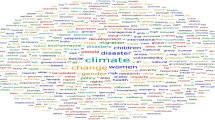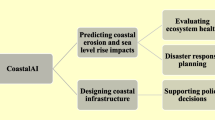Abstract
This paper investigates how transportation sector managers perceive and utilize climate science, and subsequently, how they appropriate the climate change problem. The analysis focuses on which devices they qualify as useful for translating between knowledge, policy and practice concluding with a discussion of what this suggests in the development of efficient climate adaptation strategies. The paper demonstrates that although transportation sector managers accept the findings of climate science knowledge presented to them, their understanding of the climate change problem and the range of qualifying anchoring devices used in the development of climate adaption strategies are differentiated according to where they are located in the institutional context. For transportation sector managers on the regional and district level, the climate problem is largely perceived through the occurrence of extreme weather rather than through climate science. However, this knowledge basis is not considered sufficient to support ‘knowing how to act’ and has resulted in waiting for the authorities to make standards and regulations that would translate climate change knowledge into methods of practice. We argue that the development of standards and regulations might be underestimated in relation to user demands in climate adaptation work that involves reconciling scientific information.

Similar content being viewed by others
Notes
In the news paper Verdens Gang, 25.08.2008
References
Adger WN, Dessai S, Goulden M, Hulme M, Lorenzoni I, Nelson DR, Naess LO, Wolf J, Wreford A (2009) Are there social limits to adaptation to climate change? Clim Chang 93:335–354
Cash DW et al (2003) Knowledge systems for sustainable development. Proc Natl Acad Sci U S A 100:8086–8091
Church RL, Cova TJ (2000) Mapping evacuation risk on transportation networks using a spatial optimization model. Transp Res C Emerg Technol 8:321–336
Dessai S, Hulme M (2004) Does climate adaptation policy need probabilities? Clim Pol 4:107–128
Dessai S, Hulme M, Lempert RJ, Pielke R Jr (2009) Climate prediction: a limit to adaptation? In: Adger WN, Lorenzoni I, O’Brien K (eds) Adapting to climate change: thresholds, values, governance. Cambridge University Press, Cambridge
Edwards JB (1999) The temporal distribution of road accidents in adverse weather. Meteorol Appl 6:59–68
Füssel HM (2007) Vulnerability: a general applicable conceptual framework for climate change uncertainties: a case study on water resource management in the East of England. Glob Environ Chang 17:59–72
Guston D (2001) Boundary organisations in environmental policy and science: an introduction. Sci Tech Hum Val 26(4):399–408
IPC Change (2000) Special report on emissions scenarios. IPCC, Geneva
Intergovernmental Panel on Climate Change (2007) IPCC Fourth Assessment Report Working Group II Report “impacts, adaptation and vulnerability”. IPCC, Geneva
Martin E (1994) Flexible bodies. Tracking immunity in American culture from the days of polio to the age of AIDS. Beacon, Boston
McNie E (2007) Reconciling the supply of scientific information with user demands: an analysis of the problem and review of the literature. Environ Sci Pol 10:17–38
Næss R, Solli J, Sørensen KH (2011) Brukbar klimakunnskap? [Usable Climate Knowledge? The relationship of local government employees to scientific knowledge about climate changes and climate adaptation]. Tidsskrift for samfunnsforskning (3):329–355
Organisation for Economic Co-operation and Development/International Energy Agency (2000) The road from Kyoto: current CO2 and transport policies in the IEA. OECD/IEA, Paris
Pielke RA Jr, Sarewitz D (2005) Bringing society into the climate debate. Popul Environ 26:3
Pisano PL, Goodwin X, Stern A (2002) Surface transportation safety and operations: the impacts of weather within the context of climate change. The Potential Impacts of Climate Change on Transportation Workshop, October 1–2, 2002
Ryghaug M, Sørensen KH, Næss R (2011) Making sense of global warming: Norwegians appropriating knowledge of anthropogenic climate change. Public Underst Sci 20(6):778–795
Sarewitz D, Pielke RA Jr (2007) The neglected heart of science policy: reconciling supply of and demand for science. Environ Sci Pol 10:5–16
Schneider S (2009) Science as a contact sport: inside the battle to save earth’s climate. National Geographic Society, Washington
Solli J, Ryghaug M (2009) Shaping policies sideways. Paper to 9th Nordic Environmental Social Sciences Conference ‘Knowledge, learning and action for sustainability’ London, 10th–12th June 2009
Sørensen KH (2006) Domestication: the enactment of technology. In: Berker T, Hartman M, Punie Y, Ward K (eds) Domestication of media and technology. Open University Press, Maidenhead, pp 40–61
Sørensen KH, Aune M, Hatling M (2000) Against linearity: on the cultural appropriation of science and technology. In: Dierkes M, Von Groete C (eds) Between understanding and trust. Harwood Academic publishers, Amsterdam, pp 237–257
Strauss A, Corbin J (1998) Basics of qualitative research. Techniques and procedures for developing grounded theory. Sage, Thousand Oaks
Suarez P et al (2005) Impacts of flooding and climate change on urban transportation: a system wide performance assessment of the Boston Metro Area. Transp Res Part D: Transp Environ 10(3):231–244
Transportation Research Board (2008) Potential impacts of climate change on U.S. Transportation. Special Report 290
Tribbia J, Moser S (2008) More than information: what coastal managers need to plan for climate change. Environ Sci Pol 11:315–328
Van der Sluj J, et al. (1998) “Anchoring devices in science for policy: the case of consensus around climate sensitivity”. Soc Stud Sci 28(2)
Vogel C, Moser S, Kasperson R, Dabelko G (2007) Linking vulnerability, adaptation and resilience science to practice: pathways, players and partnerships. Glob Environ Chang 17:349–364
Wynne B (1995) Public understanding of science. In: Jasanoff S, Markle GE, Petersen C, Pinch T (eds) Handbook of science and technology studies. Sage, Thousand Oaks, pp 361–388
Acknowledgments
The research was funded by the Norwegian Research Council through the NORKLIMA-programme. We thank Knut H. Sørensen, Stephen Schneider and one anonymous reviewer for helpful comments.
Author information
Authors and Affiliations
Corresponding author
Electronic supplementary material
Below is the link to the electronic supplementary material.
ESM 1
(DOCX 15.0 kb)
Rights and permissions
About this article
Cite this article
Ryghaug, M., Solli, J. The appropriation of the climate change problem among road managers: fighting in the trenches of the real world. Climatic Change 114, 427–440 (2012). https://doi.org/10.1007/s10584-012-0449-x
Received:
Accepted:
Published:
Issue Date:
DOI: https://doi.org/10.1007/s10584-012-0449-x




